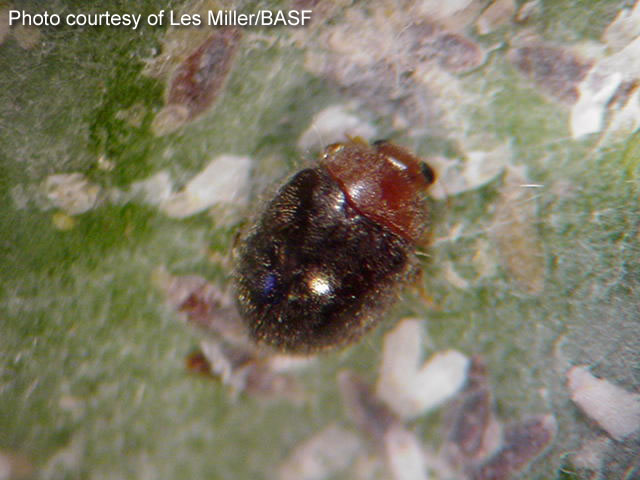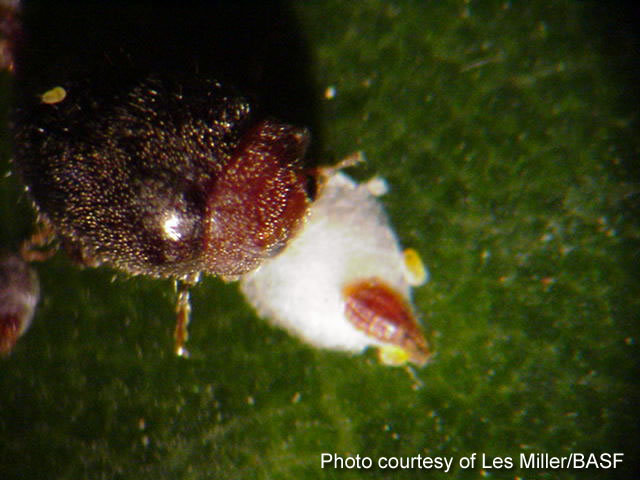Description

Lindorus lophanthae, or the Singular Black Lady Beetle, is used for the control and management of various scale insects. These lady beetles, with their small, fuzzy black bodies and dull-orange head/thorax region, love scale insects. They can clean up large populations. And, as most beetles are, L. lophanthae are very opportunistic and will eat pests other than scales: mealybugs (their crawlers or immature forms), insect eggs, etc.
L. lophanthae are shipped as pre-fed, pre-mated, insectary-reared (for the citrus industry) adults. Some popular prey of these beetles include: the scale insect species listed as hosts for Aphytis melinus and other related species as well. In fact, success has been obtained when nothing else would work; for these beetles, the list of prey is quite long.
They do seem to do well with controlling many armored scale insects and black soft scales. We’re told that they are also good purple and California red scale predators (Lepidosaphes beckii and Aonidiella aurantii, respectively).
Life-style
The smallish 2.5 mm. adult female beetles lay their eggs underneath scale insects — hundreds of them. The eggs hatch into small gray larvae. These, too, are fierce predators, growing up to 3 mm. long and consuming vast numbers of small scale crawlers and eggs (they’ll always eat the youngest, most tender morsels first).
The life-span of these predators is roughly 3 weeks in their immature stages, then 5-8 weeks as adults. The conditions for optimum performance will be between 73-87°F with a relative humidity of around 65%. But these are optimum conditions, and not necessarily a prerequisite of successful implementation. Please note, however, significantly cooler or warmer temperatures and humidity fluctuations may hamper reproduction and development a certain degree (see Benefits, next).
Benefits

These beetles have been observed going about their business in temperatures as low as 40°F.
L. lophanthae have an excellent establishment ability in the right environment. These singular black lady beetles are pretty tough — though you might not think so after seeing how small they are. They have an excellent ability to chew right through the hard covers of both armored and soft scales.
Drawbacks
They are very difficult to scout.
They can’t handle too much honeydew (soft scale poop). If they are going to be used on soft scale insects, check out the honeydew situation first and wash it off if it’s too heavy. This can be accomplished with hot water — as hot as the plants can stand it.
Scouting
Look for scales which look like they’ve been partially eaten. Finding the adults or larvae can be fairly exhaustive work. Clean new plant growth and natural honeydew reduction may also be apparent scouting indicators.
Advisories
Aside from misting the site with water before releasing and doing so in the evening (sometimes not necessary in interiors), there are other things you can do to ensure the maximum number of beetles concentrate on the pests at hand. Flowering, pollen producing plants are a big plus.
Ants, if present, should be controlled. They will defend scales from predators and parasites to protect their honeydew/excrement food, ick! Use barrier products or boric acid products to control the ants if it is necessary.
You may want to try releasing these beetles from their jar with a long pole if you’re going to be doing so in trees.
These beetles may be attracted to light colors, so watch your sticky traps, if you’re using them. If you’re catching too many beetles, remove the traps from the site or set them out for only 2-3 days per week.
Usages
Greenhouses, interiorscapes, southern orchards and citrus. Anywhere conditions are right and food is plentiful!
